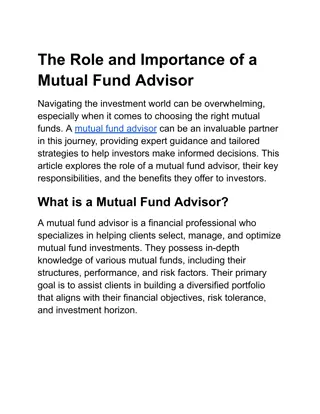
Financial Advisor_ Your Guide to Smart Financial Planning
Navigating the intricate world of personal finance can be overwhelming, especially when striving for financial security and growth. A financial advisor can be your trusted partner, helping you manage your finances effectively, plan for the future, and achieve your financial goals. This comprehensive guide will delve into the role of a financial advisor, the benefits they offer, and how to choose the right one for your needs.
Uploaded on | 6 Views
Download Presentation

Please find below an Image/Link to download the presentation.
The content on the website is provided AS IS for your information and personal use only. It may not be sold, licensed, or shared on other websites without obtaining consent from the author. If you encounter any issues during the download, it is possible that the publisher has removed the file from their server.
You are allowed to download the files provided on this website for personal or commercial use, subject to the condition that they are used lawfully. All files are the property of their respective owners.
The content on the website is provided AS IS for your information and personal use only. It may not be sold, licensed, or shared on other websites without obtaining consent from the author.
E N D
Presentation Transcript
Financial Advisor: Your Guide to Smart Financial Planning Navigating the intricate world of personal finance can be overwhelming, especially when striving for financial security and growth. A financial advisor can be your trusted partner, helping you manage your finances effectively, plan for the future, and achieve your financial goals. This comprehensive guide will delve into the role of a financial advisor, the benefits they offer, and how to choose the right one for your needs. What is a Financial Advisor? A financial advisor is a professional who provides expert advice on managing your finances. They offer guidance on a variety of financial matters, including investment strategies, retirement planning, tax planning, estate planning, and risk management. Financial advisors can help individuals, families, and businesses make informed financial decisions to ensure long-term financial health. The Role of a Financial Advisor Investment Planning and Management One of the primary roles of a financial advisor is to assist clients in developing and managing an investment portfolio. This involves assessing your financial goals, risk tolerance, and time horizon to create a tailored investment strategy. Advisors continually monitor and adjust your portfolio to ensure it remains aligned with your objectives, providing peace of mind and potential growth. Retirement Planning Planning for retirement is crucial to ensure you can maintain your desired lifestyle in your later years. A financial advisor helps you navigate the complexities of retirement planning, including
understanding your retirement income needs, optimizing your retirement accounts (such as 401(k)s and IRAs), and developing a withdrawal strategy that minimizes taxes and maximizes income. Tax Planning Effective tax planning can save you significant amounts of money. Financial advisors offer strategies to minimize your tax liability through tax-efficient investments, deductions, and credits. They can also help with tax-loss harvesting, estate tax planning, and ensuring compliance with ever-changing tax laws. Estate Planning Estate planning ensures that your assets are distributed according to your wishes after your death. Financial advisors work with you to develop an estate plan that includes wills, trusts, powers of attorney, and beneficiary designations. This process helps protect your legacy and provides peace of mind that your loved ones are cared for. Risk Management and Insurance Planning Financial advisors assess your risk exposure and recommend appropriate insurance products to protect your assets and income. This includes life insurance, health insurance, disability insurance, and long-term care insurance. Proper risk management ensures that unforeseen events do not derail your financial plan. Benefits of Working with a Financial Advisor Expert Guidance and Personalized Advice Financial advisors bring a wealth of knowledge and experience to the table. They stay current with market trends, tax laws, and financial products, providing you with up-to-date advice tailored to your unique
situation. This personalized guidance can help you make informed decisions and avoid costly mistakes. Time-Saving and Convenience Managing finances can be time-consuming and complex. A financial advisor handles the heavy lifting, allowing you to focus on other important aspects of your life. They streamline the financial planning process, handle administrative tasks, and provide ongoing support to keep you on track. Holistic Financial Planning Financial advisors take a comprehensive approach to your financial health. They consider all aspects of your financial situation, including your income, expenses, assets, liabilities, and goals. This holistic view ensures that all parts of your financial plan work together harmoniously to achieve your objectives. Peace of Mind Knowing that a professional is managing your finances can provide significant peace of mind. Financial advisors help you navigate financial uncertainties, plan for the future, and stay disciplined in your financial habits. This assurance can reduce stress and improve your overall well-being. How to Choose the Right Financial Advisor Determine Your Needs Before selecting a financial advisor, assess your financial needs and goals. Are you looking for help with investments, retirement planning, tax planning, or estate planning? Understanding your needs will help you find an advisor with the right expertise.
Check Credentials and Experience Ensure that your financial advisor has the necessary credentials and experience. Look for designations such as Certified Financial Planner (CFP), Chartered Financial Analyst (CFA), or Certified Public Accountant (CPA). These credentials indicate a high level of expertise and adherence to ethical standards. Understand Their Fee Structure Financial advisors can be compensated in various ways, including fee-only, commission-based, or a combination of both. Fee-only advisors charge a flat fee or a percentage of assets under management, while commission-based advisors earn commissions on the products they sell. Ensure you understand how your advisor is compensated and choose a structure that aligns with your interests. Ask for References and Reviews Request references from current or past clients to gauge the advisor's effectiveness and professionalism. Additionally, check online reviews and ratings to get a sense of their reputation in the industry. Schedule an Initial Consultation Most financial advisors offer a free initial consultation. Use this opportunity to ask questions, discuss your financial goals, and assess whether the advisor is a good fit for your needs. Pay attention to their communication style, responsiveness, and willingness to understand your unique situation. The Future of Financial Advising The financial advising industry is evolving rapidly, driven by technological advancements and changing client expectations. Robo-advisors, which use algorithms to provide investment advice,
are becoming increasingly popular. However, the human touch remains invaluable, especially for complex financial situations that require personalized attention. Embracing Technology Financial advisors are leveraging technology to enhance their services, offering digital platforms for portfolio management, financial planning tools, and virtual consultations. This integration of technology provides clients with greater convenience, transparency, and real-time access to their financial information. Focus on Financial Wellness Modern financial advisors are shifting their focus from solely managing investments to promoting overall financial wellness. This holistic approach includes budgeting, debt management, and financial education, empowering clients to take control of their financial futures. Regulatory Changes The financial advising industry is subject to ongoing regulatory changes aimed at protecting consumers. Advisors must stay abreast of these changes to ensure compliance and provide the best possible advice to their clients. Conclusion A financial advisor plays a crucial role in helping you achieve your financial goals and secure your future. They offer expert guidance, personalized advice, and a comprehensive approach to financial planning. By understanding your needs, checking credentials, and embracing technological advancements, you can choose the right advisor to navigate the complexities of personal finance.






















